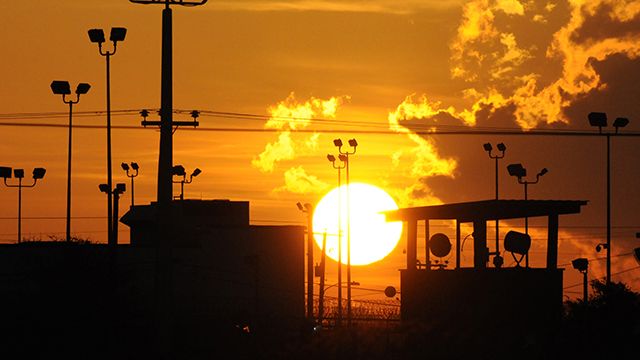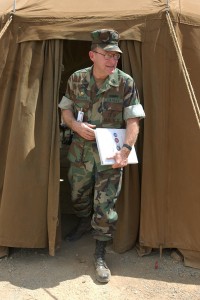
A new report from an independent task force finds that the Bush administration committed torture. The decision to do so, made by top officials and the president himself, was unprecedented. “[T]here is no evidence there had ever before been the kind of considered and detailed discussions that occurred after Sept. 11, directly involving a president and his top advisers on the wisdom, propriety and legality of inflicting pain and torment on some detainees in our custody,” writes the U.S. Constitution Project’s Task Force on Detainee Treatment.
The task force, an eleven-person team led by former Congressman Asa Hutchinson, a Republican and an undersecretary at the Department of Homeland Security during the Bush administration, and former Democratic Rep. James R. Jones, sought to piece together “an accurate and authoritative account of how the United States treated people its forces held in custody as the nation mobilized to deal with a global terrorist theat.” The New York Times called the report “the most ambitious independent attempt to date to assess the detention and interrogation programs.”
In the years since 2001, journalists, lawyers and activists have been unable to get the Central Intelligence Agency, Justice Department and Bush administration to state unequivocally that the interrogation tactics used on detainees constituted torture. The Obama administration chose not to commission an official study of interrogation and detention tactics, saying it was unproductive to “look backward.” But it is “indisputable,” the report’s authors conclude, that torture occurred at Guantánamo, the CIA’s so-called black sites and other war-zone detention centers.

Dr. Albert Shimkus, leaves a tent after speaking to reporters at Guantanamo Bay, Cuba, on Feb. 28, 2002. (Photo by Andres Leighton/AP)
One of the most fascinating chapters of the task force’s report is a profile of retired Navy Captain Albert Shimkus, now a faculty member at the US Naval War College. For a while in the early 2000s, Shimkus was one of the faces of Guantánamo as officials sought to give the press more access to the prison. Captain Shimkus oversaw the hospital for the prisoners there, and took great pride in showing that prisoners received top-notch treatment. “They were, he enthusiastically asserted, receiving care equivalent to that given to America’s own fighting men and women,” the report’s authors write. But a few years later, Shimkus came to believe that his commanders had hidden the truth. Today he is deeply embarrassed about the role he unwittingly played in covering up the torture inflicted on Guantánamo’s prisoners.
From the Task Force’s profile of Shimkus:
As he has looked back, Shimkus has pondered whether he could have or should have done anything differently. In response to a question from Task Force staff, he said that no detainee he came in contact with ever complained to him about abuse. He now realizes that some of the symptoms he observed might well have been the result of abusive interrogations, like dehydration and injuries such as cuts and bruises. But he said that he took the dehydration instances as natural in a tropical climate and thought nothing unusual about the minor injuries (the only injuries were minor during his time). Besides, it was understood that detainees could and would be roughed up permissibly when they refused to come out of their cells and had to be forcibly extracted by teams of soldiers wearing riot gear who went in with force. Shimkus said he believes that an important element in his ignorance as to what was occurring was that he wasn’t looking for any signs of willful abuse. He had assumed there wouldn’t be any.
He is, as distinct from most other senior Guantánamo figures, contrite about his participation and acknowledges some responsibility as he has pondered his own behavior straightforwardly. As to those signs that might have been plainly in view, he said, “there were things I should have picked up on, but didn’t.” While he noted he was not a forensic practitioner, he said that “an astute person would have figured it out, perhaps. I did not.” Shimkus said he understands that because of his role at Guantánamo, especially in serving as a spokesman and vouching for the place, he bears some continued measure of responsibility. “I’m always going to be historically connected with this,” he said wistfully. “This is part of my life now. Forever.”
So he relives it over and over in his courses, hoping it will benefit the senior officers who are his students at the Naval War College. Those chosen to attend the Naval War College are those who are predicted to rise in the Navy, perhaps achieving flag rank. Shimkus said he tells military medical personnel in his classes they must always be prepared to challenge superior officers; most importantly, they should raise questions at the smallest provocation. He tells the student officers that even if it affects their careers, they bear an unavoidable obligation to do so. He recognizes such complaints and inquiries will probably not yield results. “But it will at least get a second look at the situation,” he said. And, most importantly, even if it affects your career, Shimkus tells the officers, they should insist on transparency as to how prisoners in their care are treated by others outside the medical setting.
Read The New York Times article on the report.
Read the report: Constitution Project’s Report on Detainee Treatment

